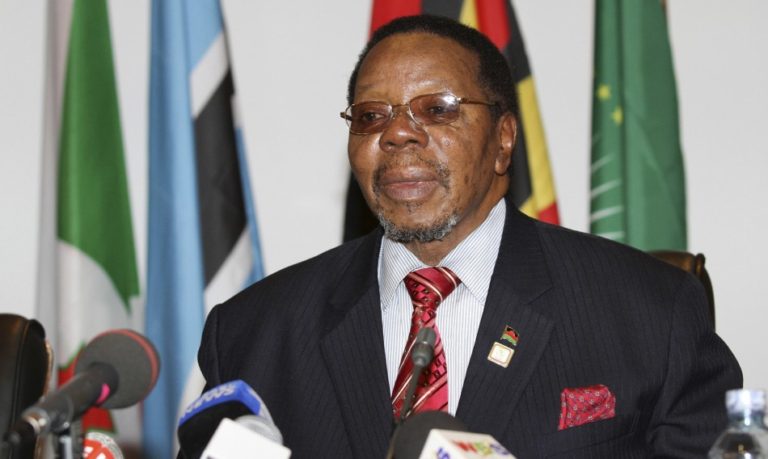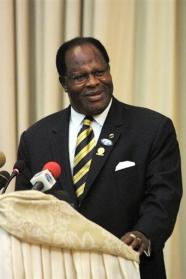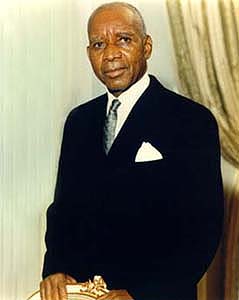On the 5th of April 2012, President Bingu Wa Mutharika died, having collapsed from a sudden heart attack. The Vice President Joyce Banda of the People Party was sworn in as President of Malawi on the 7th of April 2012. The next elections in Malawi will be held in 2014.
Malawi is a democratic, multi-party government, currently under the leadership of Madame President Joyce Banda of the People’s Party. The current constitution was put into place on May 18, 1995. The branches of the government consist of executive, legislative and judicial. The executive includes a president who is both chief of state and head of government, first and second vice presidents and a cabinet. The president is elected every five years, and the vice president is elected with the president. A second vice president may be appointed by the president if he so chooses, although he must be from a different party. The members of the cabinet are appointed by the president and can be from either inside or outside of the legislature.

The legislative branch consists of a unicameral National Assembly of 193 members who are elected every five years, and although the Malawian constitution provides for a Senate of 80 seats, one does not exist in practice. If created, the Senate would provide representation for traditional leaders and a variety of geographic districts, as well as special interest groups including the disabled, youth and women. The independent judicial branch is based upon the English model and consists of a constitutional court, a High Court, a Supreme Court of Appeal and subordinate Magistrate Courts. There are currently nine political parties, with the Democratic Progressive Party acting as the ruling party and the Malawi Congress Party and the United Democratic Front acting as the main opposition parties in the National Assembly. Suffrage is universal at 18 years of age, and the central government budget for 2007/2008 is $1.24 billion dollars.
Malawi is composed of three regions (the Northern, Central and Southern regions), which are divided into 28 districts, and further into approximately 250 traditional authorities and 110 administrative wards. Local government is administered by central government-appointed regional administrators and district commissioners. For the first time in the multi-party era, local elections took place on November 21, 2000, with the UDF party winning 70% of the available seats. There was scheduled to be a second round of constitutionally mandated local elections in May 2005, but these were cancelled by the government. In February 2005, President Mutharika split with the United Democratic Front and began his own party, the Democratic Progressive Party, which has attracted reform-minded officials from other parties and is winning elections across the country as of 2006. As of 2008, President Mutharika has implemented reforms to address the country’s major corruption problem, with at least five senior UDF party members facing criminal charges. In 2008, Malawi was ranked 11th of all countries in sub-Saharan Africa in the 2008 Ibrahim Index of African Governance, an index that measures several variables to provide a comprehensive view of the governance of African countries.
Madame President Joyce Banda (People's Party)

Joyce Hilda Banda is a Malawian politician who has been the President of Malawi since 7 April 2012. An educator and grassroots gender rights activist, she was Minister of Foreign Affairs from 2006 to 2009 and Vice-President of Malawi from May 2009 to April 2012. Banda took office as President following the sudden death of President Bingu wa Mutharika. She is Malawi’s first female president and was the country’s first female vice-president.
Who is Joyce Banda?
1950: Born
2009: Elected vice-president
2011: Fell out with President Bingu wa Mutharika but he failed to have her removed from her post
2012: Sworn in as president after Mr Mutharika’s death Southern Africa’s first female head of state
Has large charity to help educate and empower women
Her father was a well-known musician; her sister was hired to work in pop star Madonna’s schoolShe entered politics in 1999, during Malawi’s second democratic elections. She won a parliamentary seat in the former ruling party of retired president Bakili Muluzi.
He named her minister for gender and community services. Five years later, she retained her seat as a candidate for Muluzi’s party, even as Mutharika won the presidency.
The new president crossed party lines to appoint her as foreign minister in 2006. During her time as Malawi’s top diplomat, the country severed its long ties with Taiwan and established relations with Beijing.
She argued the switch would bring economic benefits to Malawi. China has since built Malawi a new parliament.
Mutharika tapped her as his running mate in the 2009 elections, but their honeymoon was short as party in-fighting intensified over his decision to anoint his brother as his successor, drawing accusations that he was trying to create a dynasty.
“The chronic disease of third term, or chieftaincy, remains one of the greatest enemies of our efforts to achieve sustainable development,” she said.
“The country is constantly caught in a vicious circle of privatisation of the state where one or two people hold the fate of the country.”
Banda’s ouster from the ruling party angered many urban voters, and she remains a popular figure for many Malawians, known for her vigorous campaigning. But her critics question her ability to steer the country through its economic crisis, with the currency trading on the black market at twice the official exchange rate.
After anti-government protests broke out in July last year, when police shot 19 people dead, Banda warned that Malawi could face more unrest ahead of the next polls.
“The road to 2014 will be rough, bumpy and tough. Some will even sacrifice their own lives,” she said.
Banda remains a role model to many women in Malawi for her gender fight in a male-dominated society.
Under the constitution the vice president is next in line and if Banda is sworn in as president, she will become Africa’s second female leader of modern times, after Liberian President Ellen Johnson Sirleaf.
Her family is now among the most influential in Malawi. She is married to retired chief justice Richard Banda. Her sister Anjimile Oponyo was hired by Madonna to run her school for girls, although that project collapsed and she was sacked by the mega-star. – Sapa-AFP Joyce Banda, who rose to prominence in Malawi as a relentless advocate for women’s rights, now appears set to become only the second female African head of state in modern times.
She become Malawi’s first woman vice-president in 2009 as the running mate of President Bingu wa Mutharika, who has died after a heart attack, sparking political suspense about who will succeed him.
Just one year after their election victory the two fell out in a spectacular succession battle. Mutharika decided to groom his brother Peter, currently the foreign minister, to become his Democratic Progressive Party’s candidate for the next polls in 2014. He expelled Banda from the party, but she refused to give up her job. Instead, she formed her own People’s Party and became one of Mutharika’s fiercest critics, >lambasting his management of an economy beset by crippling fuel shortages.
Banda was born on April 12 1950, in Malawi’s colonial capital of Zomba where her father was an accomplished and popular police brass band musician. She began her career as a secretary, but she became a well-known figure during the dictatorial era of Kamuzu Banda, no relation to her own family. She started a women’s empowerment programme, travelling throughout the country to sell the National Business Women Association, a campaign that made her one of Malawi’s most visible champions of gender equality.
She later established the Joyce Banda Foundation to empower women through girls education.
The Democratic Progressive Party
Bingu Wa Mutharika

Bingu wa Mutharika (born Brightson Webster Ryson Thom; 24 February 1934 – 5 April 2012) was a Malawian politician and economist who was President of Malawi from May 2004 until his death. He was also the president of the ruling Democratic Progressive Party, which has a majority in Malawi’s parliament as a result of the 2009 general election. During his two terms in office he was noted for presiding over the African Union, as well as several domestic controversies. He died of a heart attack in Lilongwe on 5 April. Bingu wa Mutharika was born Brightson Webster Ryson Thom on 24 February 1934 in Thyolo. Mutharika’s parents, Ryson Thom Mutharika and Eleni Thom Mutharika, were both members of the Church of Scotland Mission which later became Church of Central Africa, Presbyterian. His father was a teacher for 37 years and his mother taught the women of the Mvano group. Upon completing his primary education at Ulongwe Mission and Chingoli, Mulanje, Ntambanyama, Malamulo, in Thyolo and Henri Henderson Institute in Blantyre, Mutharika obtained a Grade A Cambridge Overseas School Leaving Certificate at Dedza Secondary School in 1956. In 1964, he was one of the 32 Malawians selected by Hastings Kamuzu Banda (President of Malawi 1961-1994) to travel to India on an Indira Gandhi scholarship for ‘fast track’ diplomas. The BBC reports that he went to India to “escape then President Hastings Banda’s crackdown on political opponents”. At some point during the 1960s, he also changed his name, to Bingu wa Mutharika. In India, Mutharika earned his Bachelor’s degree in Economics. Subsequently, he attended the Delhi School of Economics graduating with a M.A. degree in Economics. He later obtained a PhD degree in Development Economics from Pacific Western University. Mutharika also completed short courses on Business Management, Financial Analysis, Trade Promotion, Political Leadership, regional Economic Co-operation and Human Relations. Mutharika served in the Malawi civil service. He has served as Administrative Officer in the Government of Malawi and Zambia. He was offered the Deputy Governorship of the reserve Bank of Malawi and appointed Minister of Economic Planning and Development in 2002. He also worked at the World Bank as a Loans Officer and at the United Nations Economic Commission of Africa, as Director of Trade and Development Finance and as Secretary General of the Common Market for Eastern and Southern Africa COMESA, covering 22 Member States Mutharika co-founded the United Democratic Front in 1992. In 1999, he stood as a candidate in the presidential election, finishing last.
President
First term
Second term
Chairperson of the African Union
Family and personal life
Death
United Democratic Front (UDF)
Elson Bakili Muluzi (born March 17, 1943) is a Malawian politician. He was the President of Malawi from 1994 to 2004 and was Chairman of the United Democratic Front (UDF) until 2009.

Presidency
Post-presidency
2009 presidential candidacy
Dr Hastings Kamuzu Banda (Malawi Congress Party)

Hastings Kamuzu Banda (15 February 1898 – 25 November 1997) was the leader of Malawi and its predecessor state, Nyasaland, from 1961 to 1994. After receiving much of his education overseas, Banda returned to his home country (then British Nyasaland) to speak against colonialism and advocate for independence. In 1963, he was formally appointed as Nyasaland’s Prime Minister, and led the country to independence as Malawi a year later. Two years later, he proclaimed Malawi a republic with himself as president. He consolidated power and later declared Malawi a one party state under the Malawi Congress Party (MCP). In 1970, the MCP made him the party’s President for Life. In 1971, he became President for Life of Malawi itself. As a leader of the pro-Western bloc in Africa, he received support from the West during the Cold War. He generally supported women’s rights, improved the country’s infrastructure, and maintained a good educational system relative to other African countries. However, he presided over one of the most repressive regimes in Africa. He also faced scorn for maintaining full diplomatic relations with apartheid-era South Africa. By 1993, he was facing international pressure and widespread protest. A referendum ended his one party state, and a special assembly stripped him of his title. Banda ran for president in the democratic elections which followed, but was defeated. He died in South Africa in 1997. His legacy remains controversial, with some hailing him as a national and African hero, while others denounce him as a tyrant and one of the most corrupt leaders in Africa’s entire history.
Infrastructure
In 1964, after serving as a government minister in the colonial administration, Banda adopted a macroeconomic policy aimed at accelerating economic development for the betterment of Malawians. He settled on the Rostow model of “Catch Up” Economics, wherein Malawi would vigorously pursue Import Substitution Industrialization (ISI). This entailed both a quest for “self-sufficiency” for Malawi – becoming less reliant on its former colonial master – and growth of an industrial base that could ensure Malawi was capable of producing its own goods and services. Such capacity would then be used to catch up and even overtake the West. An infrastructure development program was initiated under the various Development Policies (DEVPOLs) documents that Malawi adopted from 1964 onwards. The country’s infrastructure benefited through massive road construction programs. With the decision to shift the capital city from Zomba to Lilongwe (against vociferous objections from the British preference for the economically and well developed Blantyre), a new road was built linking Blantyre and Zomba to Lilongwe. The Capital City Development Corporation (CCDC) in Lilongwe was itself a beehive of infrastructure development, supported by planning and funds from apartheid-era South Africa. The British refused to finance the move to Lilongwe. The CCDC became the sole development agent for Lilongwe; putting up roads, the government seat at Capital Hill, etc. Other infrastructure entities were added, such as Malawi Hotels Limited, which undertook massive projects such as the Mount Soche, Capital Hotel and Mzuzu Hotel. On the industrial side, Malawi Development Corporation (MDC) was tasked with setting up industries and other businesses. Meanwhile, Dr. Banda’s own Press Corporation Limited and MYP’s Spearhead Corporation embarked on various business initiatives that lead to an economic boom during the mid-to-late 1970s. Banda personally founded Kamuzu Academy, a school modelled on Eton, at which Malawian children were taught Latin and Ancient Greek by expatriate classics teachers, and disciplined if they were caught speaking Chichewa. Many of the schools Alumni have assumed leadership roles in medicine, academia and business in Malawi and abroad. The school remains one of Dr Banda’s most lasting legacies. It is claimed, probably incorrectly and unfairly, that Dr Banda spent almost all the country’s education budget on this project, while increasingly ignoring the needs and welfare of the greater majority [80%] of Malawians toiling in the rural areas. The National Rural Development Program and Rural Growth Centers were tentative and belated policies aimed at diverting rural populations from moving to the few urban areas which Dr. Banda’s ISI macroeconomic policies had created and were now being battered by the arrival of more and more rural people seeking better opportunities. Eventually, with the collapse of the Cold War, the World Bank and International Monetary Fund arrived, imposing a series of Structural Adjustment Programs from 1987.




